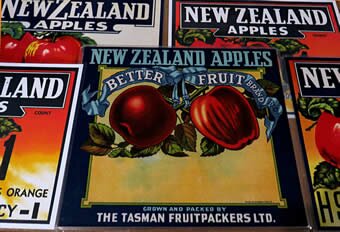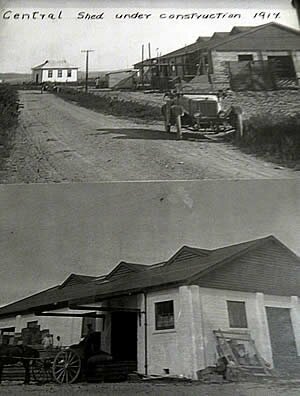[ Return ] [ Other news articles ]
[ Other news articles ]
Tasman's apple industry history featured at AGM
June 28th, 2013
[by Coralie Smith]
The AGM of the Motueka and District Historical Association took place on Saturday 22nd June, when guest speaker Colin Rush told of his family involvement with the apple industry at Tasman.
There were few changes to the committee. George Bunn has retired and president Patsy O'Shea thanked this quiet gentleman for his service to the association over the years. George will continue as archivist.
Eileen Thawley has joined the committee. Eileen brings a lifetime of history to the group having been involved in family history, hop and apple industry history as well as the history of the Mapua and Moutere Hills. Eileen was also the author of the Nelson Province World War 1 & 2 memorials and rolls of honour books commissioned by the TDC.
The association continues to be involved with local activities involving history, the latest being the Historical Plaques Pathway in Decks Reserve with the accompanying book 'Along the Path'.
The next project we have been consulted on is the Vision Motueka mural on Industry. The WW1 Commemorations will also be seeing us finding out who the people were that went away, what their experiences were and how those that stayed at home faired.
The research room continues to be busy, helping people find family and learn about our local history. The journal committee are busy putting together the next publication due out later in the year. With 35-40 members the association is in good heart and expects most of those members will attend the talks planned for the coming months.
We always welcome visitors at our meetings and hope you too get hooked on history.
|

|

Apple labels over the years
|
The apple industry at Tasman
Colin Rush then spoke to the group about his family involvement with the apple industry at Tasman. It began when the McKee family were planning the development of Tasman/Mariri/Moutere Hills/Mahana and Mapua for the growing of apples. These areas were suitable because the soil was clay so held moisture well. As long as plantings were on the hill drainage wasn't a problem. There weren't many frosts being north facing and near sea breezes.
Colin's grandfather Fred Nottage was brought from Australia by the McKees to set up and organise the planting of the orchards. He was paid partly with land which is where the Rush family still farm today. Colin's father Eric Rush came to the district in 1939 and married Betty Nottage.
Early varieties of apples have all but disappeared although Coxs Orange is still grown. Sturmers, Delicious and Jonathans made way for Royal Gala and Braeburn and then Fiesta and Pacific Rose, the latter two being failures. New varieties are always being tested but it is uneconomic to change varieties too many times in one's working life. The Asian markets are what the Rushes are aiming for growing Fuji and similar types.
The Rush family still use the Central Shed which was set up as a co-operative packhouse in the 1920s, servicing 7 or 8 orchards. The 1940s saw growers setting up their own packhouses, the 1960s they went back to co-operatives only to swing again to individual packhouses in the 1980s.
Apple industry governing bodies have been cyclical too, starting with each grower selling their own apples, an Apple and Pear Board, which was the sole exporter of apples, being set up in 1948 with the industry being deregulated again in recent years. A mistake in Colin's opinion, but with signs that the main exporters are starting to work together again.

Central Shed, Tasman, in the 1920s
|
Some of the early packhouses still stand by the estuary, with foundations of others visible at low tide. Small boats came right up to the jetty by the packhouse to take the apples to the wharf at Motueka or trucks carted them to Mapua by road where they were shipped on to Wellington, then overseas. Coolstores at both ports helped keep the apples in good condition.
Picked in the early years straight into wooden boxes that held 40 or 80 pounds per box, a small industry sprang up with mills supplying timber for the boxes. The apples were wrapped in paper and competitions were held for the fastest wrapper.
Grading machines came in although rudimentary at first. Colin remembers one that had small canvas bags at the sides in which varying amounts of nails were placed to alter the weight at which the apple rolled out. Graders progressed until today they are run more or less by computers.
Colin has two sons who are taking over as the next generation of apple growers in the Rush family.
A school function held in the Central Shed the night before had brought back memories to Colin of the dances, farewells to soldiers and other community events that had been held there in the past. He hopes it will continue to be used as a Community Centre. He is confident there will always be an apple industry, it just won't be the same as it was 100 years ago.
>> , to be added to the page. [If this link doesn't work, use this form instead]
[ Return ]
[ Other news articles ]
We wish to thank these local community-minded businesses who generously sponsor our site. They recognise the value of supporting this community asset, and in return Motueka Online is pleased to use and recommend their services whenever appropriate.
Ray White Motueka, Motueka Floral Studio, Nelson Building Society, House of Travel,
Greenwood Active Health, Lynette Mytton, T.O.A.D Hall,